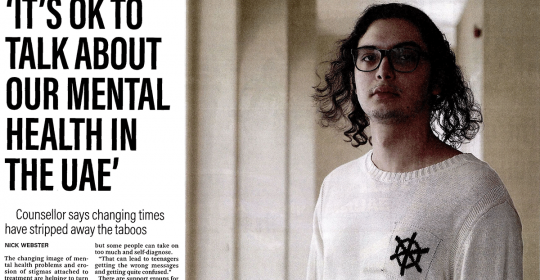
Dubai support groups helping tackle stigma of mental health problems
A variety of groups at the German Neuroscience Centre, as well as the use of social media, are helping many people come to terms with conditions that would otherwise fester for years.
The original full article was published in The National on, 05.08.2017
The changing dynamic of mental health issues and the slow disintegration of social stigmas once attached to its treatment are helping change lives in the UAE like never before.
When counsellor Fadwa Lkorchy (German Neuroscience Center) moved to the country 14 years ago from America, the nation was trapped in a grip of stigma and taboo with regards mental health, she says.
Much has changed since then. The rampant rise of social media has borne much of the brunt of criticism about why young people appear to talk less and have become more inactive in life.
However, one thing the rise of Facebook and Twitter has done, according to mental health experts working in the field, is help break down traditional social barriers.
A key area is talking about mental health, depression and anxiety – with young people prepared to share their experiences more than ever before to get the help they need and move on in life.
“One of the biggest issues here is stigma around mental health, it is changing and I am seeing more nationals and people willing to take part in couple therapy than ever before,” Ms Lkorchy said.
[…]
There are different support groups on offer at the German Neuroscience Centre in Dubai Healthcare City for depression and anxiety.
One is aimed at those aged 19 to 40 and has a format for people to express their feelings and share their experiences about what helps them, to encourage others.
A second group for Arab women talks about family problems, personal development and parenting skills, while a third group specifically for teenagers aged 12 to 18 is available to help them relieve social pressure or the pressures from school. They learn how to set goals and deal with conflict management.
[…]
One of those seeking help at the GNC is Fatima, a middle-aged housewife with two children who has struggled with bipolar since her teenage years.
She has faced a history of misdiagnosis, taboo and fear of social stigma.
“I’ve struggled all my life, on and off medication, until I started therapy last year,” she said.
“It opened my world to taking back control over bipolar, instead of the other way around, understanding myself and gaining acceptance.”
The therapy included her family, so they gained more understanding of her mood and are able to give her the support she needs to become proactive instead of hiding her guilt, shame and helplessness.
Bipolar disorder, also known as manic-depressive illness, is a brain disorder that causes unusual shifts in mood, energy, activity levels and the ability to carry out day-to-day tasks.
Fatima visited the support group for personal growth to find a way to leave the shadow of bipolar diagnosis.
She also wanted to share her experience with mental illness, and help others understand the condition better.
The support group is part of her ongoing treatment as well as writing a bibliography of her experience of living in the shadow of bipolar.
Each group runs once a month at the German Neuroscience Centre. For more information call 04 4298 578.
The original full article was published in The National on, 05.08.2017

